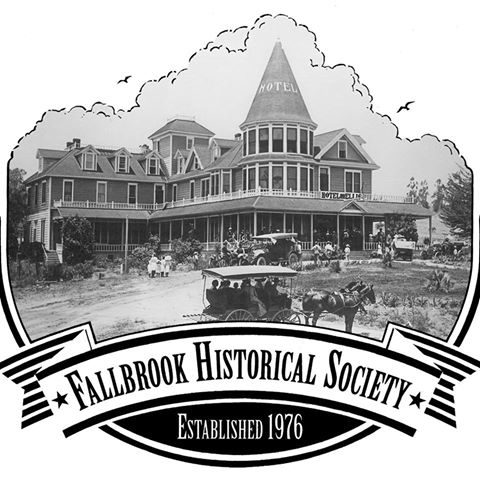

























7000 BCE:
Luiseno Indians occupy lands between San Luis Rey and Santa Margarita rivers
1798:
San Luis Rey Mission Founded
Early 1800s:
- 133,000 acres of Santa Margarita Rancho granted to Pio and Andres Pico. Most of the Rancho is now Camp Pendleton; a small portion is now included in Fallbrook
- Monserate Rancho granted by Mexican Governor Pio Pico to Ysidro Maria Alvarado.
- California becomes a U.S. Territory
- Gold Rush begins
1850s:
- California becomes 31st U.S. State
- Vital Reche settles in Fallbrook, takes up commercial bee-keeping and brands his honey “Fall Brook”, after his home town of Fallbrook, PA.
- Alvarado and Pico families raise cattle on Rancho Monserate and Rancho Santa Margarita
1860s:
- Prospective homesteaders settle on periphery of the Ranchos and raise bees.
- U.S. Civil War
- Vital Reche donates land at Live Oak Park and Reche Rd. for the first Fallbrook School, The Fall Brook School.
1870s:
- Second school built
- Fallbrook Depot, originally built in the Santa Margarita Canyon, connected San Diego with points north. Fallbrook is known as the lunch stop for runs to Los Angeles or Yuma, Arizona
- Non-ranch land opened for homesteading
- First school district formed
1880s:
- Eleven subdivisions added, lumberyards, 2 hotels and a bank
- Vital Reche obtains first post office in Fallbrook
- Real estate boom in Fallbrook
- Fallbrook’s first newspaper, the Fall Brook Review
- First church, the Methodist Episcopal South Congregation
- First lodge, The Good Templars, which evolved into the Women’s Christian Temperance Union
- First Fallbrook Festival, the Strawberry Festival held in April
- Irrigation District organizes and brings water from the Santa Margarita River
- Fallbrook Water and Power Co. surveys for a dam and an aqueduct
- Cates Hotel built with 60 rooms. Later named The Naples and then the Hotel Ellis
1890s:
- Economy declines. Bank closes, newspaper editor moves again. Irrigation District fails.
- The second block on Main St. burns to the ground, the volunteer bucket brigade was the only firefighting organization at the time
- Fallbrook Irrigation District organized
- 3rd school built
- Fallbrook Masonic Lodge founded
- Second school burns down, Reche School rebuilt the same year
- Directors of Fallbrook Irrigation District vote to dissolve the company
1900s:
- Olives become more important crop than honey
- First telephone service begins
- Saturday Afternoon Club established, later to be known as the Fallbrook Women’s Club
- Fallbrook telephone directory lists 19 subscribers
1910s:
- Citrus Association builds lemon packing plant to take advantage of new rail line into town
- Bank reopened
- Chamber of Commerce organized
- Inland auto route to Los Angeles passes through Fallbrook
- The Fallbrook Enterprise newspaper established
- First avocados planted
- Fallbrook High School built
- First library established
- World War I
- Floods permanently close railroad station near De Luz
- First burial in the Masonic Cemetary, following sever flu epidemic
- First Girl Scout troop west of the Rockies founded
- Farm Bureau Center in Fallbrook
- New railroad depot was built on Alvarado Street
1920s:
- Fallbrook is on the major north/south road between Mexico and Canada, route now known as U.S. 395
- Live Oak Park dedicated as County Park
- First white line painted on Main Street
- First sidewalks built on Main Street
- Road paved between Fallbrook and Oceanside
- Fallbrook Public Utility District (FPUD) formed
- Road between Fallbrook and Bonsall paved
- Order of the Eastern Star organized
- Fallbrook Irrigation District is revived
- Tomato product cannery opened
- Bonsall Bridge opens
- First Safeway grocery store opens
- Hotel Ellis ceases operations
1930s:
- Great Depression, and the Civilian Conservation Corps creates the rock channel for the stream in Live Oak Park
- San Diego County stations a fire truck in Fallbrook, a Model A Ford
- Fallbrook Garden Club began
- The C.D.F replaces the Model “A” fire truck with a 1932 Chevrolet fire truck
- Reche Community Service Club organized
- First Fallbrook Hospital opened
- 3rd annual Future Farmers Day parade and show
- World War II begins
1940s:
- U.S. enters WWII
- Avocado acreage increases dramatically
- Dial telephone service introduced, bypassing the Operator
- U.S. Government purchased land for Camp Pendleton
- Fallbrook Chamber of Commerce incorporated
- Rotary Club organized
- American Association of University Women (AAUW) organized
- U.S. 395 moved inland by 1948, thus Fallbrook is no longer on the “Inland Route”
- First Fallbrook High School condemned as structurally unsafe to earthquakes, and a new one is built
1950s:
- Fallbrook Community Hospital established
- Fallbrook Hospital District approved by voters
- Fallbrook Little League organized
- Optimist Club established
- Fallbrook Gem and Mineral Society (FGMS) founded
- Hotel Ellis demolished
1960s:
- Fallbrook Hospital opens on Elder Street
- James E. Potter School built
- Boys and Girls Club incorporated
- First Avocado Festival. Avocado Festival Excursion Train brought attendees from Los Angeles to Fallbrook Depot
- Friends of Fallbrook Library formed, sponsored by the American Association of University Women (AAUW)
- Art Club began
- Pala Mesa Golf Course built
- Fallbrook Airpark opened with a dirt landing strip, and construction of hangars begins
- Boys Club received becomes affiliated with Boys Clubs of America
- New Safeway store replaces the old one
- New building for the Library is built
1970s:
- Fallbrook Historical Society is formed
1980s:
- Fallbrook Land Conservancy formed
- Library destroyed by arson 1985
- Library rebuilt 1987
1990s:
- Fallbrook Art and Cultural Center opens in Harrison Drug Store building
- First Murals in Fallbrook
- $30 million remodeling of Fallbrook High School
2000s:
- x
- y
- z
2010s:
- New larger library replaces 1987 building.
- First Murals in Fallbrook
- $30 million remodeling of Fallbrook High School



Fallbrook Union High School 1962
